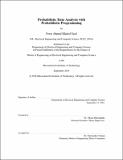Probabilistic data analysis with probabilistic programming
Author(s)
Saad, Feras Ahmad Khaled
DownloadFull printable version (2.299Mb)
Other Contributors
Massachusetts Institute of Technology. Department of Electrical Engineering and Computer Science.
Advisor
Vikash Mansinghka.
Terms of use
Metadata
Show full item recordAbstract
Probabilistic techniques are central to data analysis, but dierent approaches can be challenging to apply, combine, and compare. This thesis introduces composable generative population models (CGPMs), a computational abstraction that extends directed graphical models and can be used to describe and compose a broad class of probabilistic data analysis techniques. Examples include hierarchical Bayesian models, multivariate kernel methods, discriminative machine learning, clustering algorithms, dimensionality reduction, and arbitrary probabilistic programs. We also demonstrate the integration of CGPMs into BayesDB, a probabilistic programming platform that can express data analysis tasks using a modeling language and a structured query language. The practical value is illustrated in two ways. First, CGPMs are used in an analysis that identifies satellite data records which probably violate Kepler's Third Law, by composing causal probabilistic programs with non-parametric Bayes in under 50 lines of probabilistic code. Second, for several representative data analysis tasks, we report on lines of code and accuracy measurements of various CGPMs, plus comparisons with standard baseline solutions from Python and MATLAB libraries.
Description
Thesis: M. Eng., Massachusetts Institute of Technology, Department of Electrical Engineering and Computer Science, 2016. This electronic version was submitted by the student author. The certified thesis is available in the Institute Archives and Special Collections. Cataloged from student-submitted PDF version of thesis. Includes bibliographical references (pages 48-50).
Date issued
2016Department
Massachusetts Institute of Technology. Department of Electrical Engineering and Computer SciencePublisher
Massachusetts Institute of Technology
Keywords
Electrical Engineering and Computer Science.